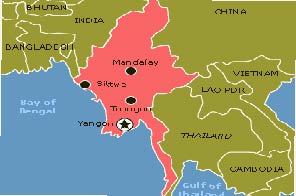Fighting breaks out in Myanmar
BEIJING: Fresh fighting broke out Saturday between Myanmar's junta and ethnic rebels forcing a continued flow of refugees into China, where a bomb killed one person, witnesses and state media said.
Clashes in Myanmar's remote northeast have driven up to 30,000 refugees across the border in recent weeks, the UN has said, causing China to issue a rare admonishment to its neighbour and ally to resolve the conflict.
Battles that erupted this week in Kokang, a mainly ethnic Chinese region of Myanmar's Shan state, have violated a 20-year ceasefire and analysts have warned the fighting could escalate into full-scale civil war.
Refugees were still crossing the border Saturday, said Khuensai Jaiyen, editor of the Shan Herald Agency for News.
"It's not like the other day, we're not hearing of too many but they are still crossing," he told AFP.
The state-run China Daily, quoting a Chinese Red Cross official, said a bomb was thrown across the border Friday, killing one and injuring several others in a remote mountainous region of China's southern Yunnan province.
Only sketchy details of the fighting in Myanmar emerged Saturday, but China's Global Times said one of its correspondents in the area witnessed "fierce" gunfire between the Kokang ethnic army and government forces.
The state newspaper said Chinese border guards had been put on alert to prevent the conflict spreading to China.
A resident of China's Zhenkang county on the border, who gave only his surname Xie, told AFP he heard gunfire in the distance early Saturday.
"It was pretty loud. Everybody could hear it. I heard it for about an hour," he said.
A statement from the Chinese foreign ministry on Friday said it "hopes that Myanmar can appropriately solve its relevant internal problems and safeguard the stability of the China-Myanmar border".
It also urged its neighbour "to protect the safety and legal rights of Chinese citizens in Myanmar".
China is one of the few allies of Myanmar's isolated junta, its main source of military hardware and a major consumer of its vast natural resources, despite Western concerns over the military-ruled nation's rights record.
Refugees who had crossed to the border town of Nansan were being housed in tents or other makeshift shelters and authorities were providing them blankets, medical care and other necessities, Chinese state media reports said.
The Global Times quoted Kokang leader Peng Jiasheng as saying in an interview that his forces had killed over 30 Myanmar government soldiers and captured another 50. It did not give his location.
The Washington-based US Campaign for Burma, which uses Myanmar's former name, also said late Friday around 30 junta soldiers had been killed with another 40 injured and 20 missing, citing local sources and ethnic media.
It said around 7,000 junta troops were now in the region, where they had at least eight military encounters with rebel groups on Thursday and Friday.
Win Min, a Thailand-based Myanmar analyst and academic, said tensions had grown because the junta was trying to exert control ahead of the elections in 2010.
He said the army wanted to bring rebel groups under its command as border guard forces, but many rebels, seeking greater autonomy from the junta, were reluctant.
"The Burmese military are showing ceasefire groups that if they don't agree with their plans they are going to fight," he said.






